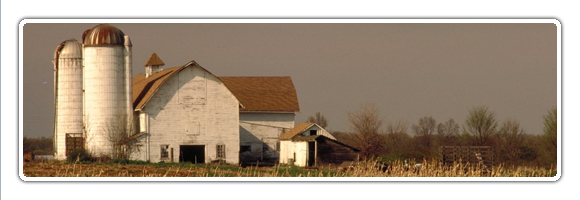
Oklahoma Farm Equipment Liability
The farming industry relies heavily on farm equipment and machinery. Unfortunately, farm equipment and machinery can be extremely dangerous and accidents can result in horrific injuries disrupting or even claiming lives.
Farmers' livelihoods and even entire farming operations can be threatened because of injuries to key personnel, and liability claims arising from accidents.
Contact us today if you or a loved one has been injured or killed as a result of the use of a farm equipment that is unsafe by using the form on your left or by calling us toll-free at 1 (866) 664-0400 for a FREE case review.
Typical farm equipment liability claims resulting from injuries can include:
Power-Take-Off (PTO) Safety
The power-take-off (PTO) allows a farmer to harness the power of the tractor engine to drive a variety of machines. It is just as important today as it was when it was first introduced. However, a healthy respect for the PTO driveline's potential for causing injury and death is needed.
- Keep all PTO shielding (including the master shield) in place.
- Repair or replace damaged or missing shields.
- Stay safely away from unshielded moving parts.
- Watch your step when walking or working around a running machine.
- Wear work clothing with no loose ends or strings to catch on or be caught by machinery.
- Keep long hair under a cap or tied back to prevent it from being caught by the machinery.
- Keep children and non-workers out of the danger zone.
- Stop the PTO when dismounting from the tractor.
PTO Inspection
- Is the PTO shaft shielded?
- Is the master shield in place?
- Is the stub shaft shield available and in use when the PTO is not in operation?
- Is the PTO shielding damaged?
- Is the PTO shaft shield working properly?
- Are all workers wearing proper clothing?
- Is long hair tied back or under a cap?
Grain Storage Structures and Handling Equipment
Storage and handling of large volumes of grain or feed on farms is common in many areas. Automated equipment has made handling of grain easy and fast. But, grain storage structures and handling equipment create hazardous work areas. Farm workers should make sure they take the proper steps to put safety first to prevent injuries, illnesses and even death.
- Label grain bins to warn of entrapment hazards.
- Lock entrances to grain handling areas to keep bystanders and children out.
- Install ladders inside bins.
- Do not enter grain bins that are being loaded or unloaded. Flowing grain can trap and suffocate you in seconds.
- If it is necessary to enter a bin, shut off and lockout power before entering. Use a safety harness and safety line.
- Have several people available outside the bin to lift entrant out in case of an emergency.
- Wear NIOSH-approved dust-filtering respirators when working in and around grain handling areas. High amounts of dust and molds could be present and are extremely dangerous.
- Wear approved hearing protection when working around noisy equipment, aeration fans, dryers, etc.
- Be very cautious of grain that may have gone out of condition. Crusted grain may have cavities beneath the surface that can collapse, leading to entrapment and suffocation.
- Keep bystanders and children away from grain bins and grain handling equipment.
Grain Handling Equipment Inspection
- Are ladders in good condition?
- Is lockout available for power?
- Is electrical equipment safe?
- Are overhead power lines nearby?
- Are approved respirators available?
- Are guards and shields in place?
Anhydrous Ammonia Safety
Anhydrous ammonia is an important source of nitrogen fertilizer for crops. The improper handling of anhydrous ammonia can have catastrophic results on both plants and farm workers. Common injuries are severe burns to eyes, skin and the respiratory tract.
- Personal protective equipment (PPE) should always be worn. Standard PPE should be non-vented goggles, rubber gloves with thermal lining, face shield or an approved respirator. Wear a lightweight rubber suit, or (at the very least) a long sleeve shirt and coveralls.
- Keep anhydrous ammonia tanks out of direct sunlight so the pressure relief valve does not have to vent.
- Make sure anhydrous ammonia tanks are not filled beyond the recommended capacity.
- Use care when handling the hose end valve so that it does not open accidentally. Do not move hose by handling valve handle.
- Be sure to bleed hose coupling before disconnecting. Use care when cleaning plugged knives as anhydrous ammonia could be built-up behind the plug.
- Use emergency water supply for at least 15 minutes if exposed to anhydrous ammonia and then seek emergency medical attention.
Fertilizer Equipment Inspection
- Are hoses in good condition?
- Are fittings clean and free from rust?
- Do low-pressure tubes have any leaks?
- Are knives plugged?
- Is the tank secure with a locking hitch pin?
- Is the pressure relief valve operating correctly?
- Does the tank have five gallons of fresh water?
- Is PPE available and being worn?
We can handle your potential legal case if you are in any of these Oklahoma cities. Even if your city is not listed you may still speak with one of our Oklahoma attorneys by filling out our contact form or calling us toll-free at 1 (866) 664-0400.
Ada, Afton, Altus, Alva, Anadarko, Ardmore, Atoka, Bartlesville, Blackwell, Broken Arrow, Catoosa, Chandler, Checotah, Chickasha, Claremore, Clinton, Del City, Duncan, Durant, Edmond, El Reno, Elk City, Enid, Erick, Frederick, Glenpool, Grove, Guthrie, Guymon, Henryetta, Idabel, Lawton, Locust Grove, Mcalester, Miami, Midwest City, Moore, Muskogee, Norman, Oklahoma City, Okmulgee, Owasso, Pauls Valley, Perry, Ponca City, Poteau, Pryor, Roland, Sallisaw, Sand Springs, Savanna, Shawnee, Stillwater, Stilwell, Stroud, Tahlequah, Tulsa, Vinita, Wagoner, Weatherford, Woodward, Yukon
Copyright © 2006 Garrett Law Office, P.C.
111 W 5th Street | Tulsa, OK 74145
Phone: 918-622-9292 | Fax: 918-549-6794
